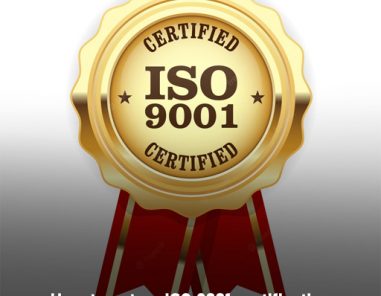
How to get an ISO 9001 certification
The ISO 9001 certification gets your Quality Management System (QMS) recognis...
Read MoreIrrespective of the product that you produce, customer satisfaction is of paramount importance. ISO standards are a great way of ensuring that all your products are created using efficient operations while saving costs and reducing wastage. In this article, we will talk about the popular ISO certifications in the manufacturing industry, going on to talk about the role of an ISO consultant and the approximate cost of the certificate.

Manufacturing companies generally acquire ISO certifications to emerge as efficient and effective. ISO certifications allow manufacturing sector companies to assess and identify all the potential risks related to the products in addition to finding practical measures to mitigate those issues.
Moreover, ISO certifications allow manufacturing companies to comply with high-standard manufacturing quality management systems, thereby improving their efficiency, reducing costs, improving profits, and winning customer trust.
ISO certification is a great tool for guaranteeing cooperation and effectiveness across the entire manufacturing network.
Different businesses have different needs. For example, an ISO for construction company may be different from an ISO for a small business. Next, we examine the needs of manufacturing companies.
There are numerous ISO certifications that are applicable to the manufacturing industry. Some of the more common ones include:
The ISO 9001 standard is an international standard that helps in the implementation of an effective Quality Management System (QMS) within an organisation. A QMS helps in the assessment of quality-related risks and structuring appropriate quality controls, so that consistency can be achieved in the delivery of products.
With ISO 9001 certification, the quality of manufactured goods can be assured, thereby helping to win the trust of customers. ISO 9001 also helps organisations identify the requirements of their target audience and implement procedures that allow them to consistently exceed expectations. In fact, if a vendor acquires ISO 9001 certificate, it acts as a proof that the raw materials sourced for production are of premium quality. Using ISO 9001 consulting can help you get more information.
ISO 14001 is internationally recognised for addressing the growing concerns of the deteriorating environment. By helping organisations implement an effective Environmental Management System (EMS), the standard allows businesses to check the activities in order to limit their negative impact on the environment. The biggest benefit of ISO 14001 certificate is that it proves your credibility as a “green” manufacturer, helping you acquire the loyalty of environmentally conscious clients.
The ISO 45001 standard provides a framework for implementing a robust Occupational Health and Safety Management System (OHSMS). Majority of the manufacturing companies have to work in a risky occupational environment. With the implementation of OHSMS, organisations can take care of the safety and the well-being of their employees.
With over a million certified organisations across 170 countries, ISO 9001 is the international reference framework for the development and implementation of a quality management system (QMS).
With over 300,000 certificates issued worldwide, the ISO 14001 standard provides a framework for the creation of an effective environmental management system (EMS).
ISO 45001 is the world’s first international occupational health and safety (OH&S) standard. It sets the requirements for OH&S management to help employers provide a healthy and safe working environment.
ISO/IEC 27001 sets out the requirements for establishing, implementing, maintaining, and continually improving an information security management system (ISMS) to protect the security of information assets.
To acquire the ISO certificate, you need to document your core processes and implement a management system in accordance to your chosen standard. After implementing your management system, you need to verify it for its effectiveness.
A Gap Analysis consists of verifying your current system’s effectiveness by auditing your operating processes to identify how closely aligned they are with the recommendations outlined in the chosen standard. Since ISO standards are filled with technical requirements, hiring an ISO consultant becomes extremely helpful. An ISO consultant would conduct an in-depth gap analysis to identify deficiencies in your management system.
Based on his or her findings, the ISO consultant would make an audit report, where a summary of your deficiencies would be provided to you in addition to customised advice.
The consultant would either advise you to implement various corrective actions or preventive actions to mitigate these deficiencies. By incorporating the advice of the ISO consultant, not only will you improve the efficiency of your management system, but you will also be able to clear your certification audit in your first trial. So, hiring an ISO consultant helps to save time, effort, energy and resources.
To select the most appropriate ISO consultant for your manufacturing company, ask for their experience, go through their testimonials and have an in-depth conversation with them to determine their working style.
As there is no universal size of a manufacturing company, there is no universal cost of ISO certification. The cost depends largely on the size of your organisation and its complexity. However, the majority of the consultants charge $15,000 per year for a medium-sized company.
Copyright © 2022 The ISO Council | Privacy Policy